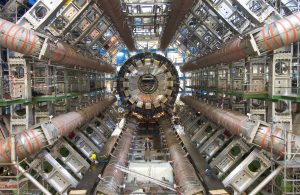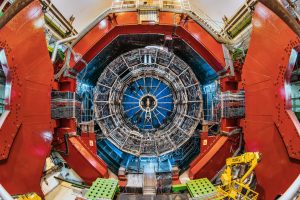Assessment of benefits of Czechia in international R&D organisations
In the second half of 2021, the Ministry of Education, Youth and Sports (MEYS) held an assessment of benefits of membership of Czechia in international R&D organisations that operate top-class research infrastructures. The monitoring exercise followed the principles of the international peer-review and served to assess benefits and impacts of the Czech participation in the CERN (European Organisation for Nuclear Research) EMBC (European Molecular Biology Conference), EMBL (European Molecular Biology Laboratory), ESA (European Space Agency), ESO (European Southern Observatory), JINR (Joint Institute of Nuclear Research) and VKIFD (Von Karman Institute for Fluid Dynamics) international R&D organisations. After the first assessment procedure, which was held in 2016, the 2021 evaluation round was the second of its kind, and as in 2016, in 2021, the international assessment committee also gave valuable recommendations on how to increase benefits of the Czech membership in international R&D organisations and maximise them. The total value of the Czech contributions to the above-mentioned international R&D organisations reached the level of nearly CZK 870 million in 2021.
CERN – ATLAS Experiment (A Toroidal LHC ApparatuS)
Evaluation methodology and international review committee
The methodology to monitor the benefits of the Czech membership in international R&D organisations included a wide range of evaluation criteria, which aimed at a large variety of attributes related to the Czech membership in international R&D organisations and benefits thereof. The monitoring focused on how Czechia participates in international R&D organisations in terms of policy- and strategy-making, coordination of Czech political and research stakeholders, or their representation in the governing and advisory bodies of international R&D organizations. However, the main focus was put on evaluating how the Czech user communities engage in scientific experiments, research programmes, technology development, knowledge transfer, procurement, and educational and other training activities that are implemented and offered by international R&D organisations. The assessment process itself combined panel evaluation with external reviews. The international review committee, consisting of renowned international experts on research infrastructures, recorded the conclusions in the form of consensus reports, emphasizing the strengths and weaknesses, as well as threats and opportunities for the future.
CERN – ALICE Experiment (A Large Ion Collider Experiment)
Experimental facilities and research programmes
Overall, Czechia uses opportunities offered by international R&D organisations to the Czech research and industrial communities very solidly with regard to the Czech membership fees. Czechia is intensely involved in their research programmes and technology development of scientific instrumentation, in particular with regard to the CERN’s ATLAS and ALICE experiments, the JINR’s NICA particle accelerator complex, the SHE Factory and the Baikal-GVD neutrino telescope, or the ESA’s Solar Orbiter and JUICE space missions. Nevertheless, there is also the potential for more intensive involvement, e.g., when it comes to the construction phase of the ESO’s ELT telescope. Due to the robust engagement in the new key projects, such as the CERN’s AWAKE and FCC, or the ESA’s ATHENA, LISA and Comet Interceptor, it’s possible to expect further progress of these benefits in the future. As for EMBL, new opportunities will be brought by both the newly opened state-of-the-art EMBL’s Imaging Technology Centre and the EMBL’s new scientific programme, which directly reflects, inter alia, also the needs of the Czech life sciences. Czech scientists are also among the major contributors to scientific publications arising from the use of experimental instruments of international R&D organisations, which applies to the science-disciplinary areas of the nuclear and particle physics, astronomy and astrophysics, as well as the space activities and life sciences. The level of involvement of the Czech research community in the research programmes of international R&D organisations and the use of scientific data is very high and exceeds the level of the Czech financial contributions to their funding.
ESA – Solar Orbiter Mission
Industrial procurement and technology transfer
Czechia has also very decent results in participating in industrial tenders announced by international R&D organisations. In the case of CERN, Czechia is even one of the most successful Member States. High industrial return is also a feature of the Czech membership in JINR. Nevertheless, a certain deficit is the persistent inability of Czech companies to participate in the high-volume contracts for the supply of complex technological devices of international R&D organisations. There’s considerable potential in this area, especially for ESA and ESO, in whose industrial procurements could Czech companies play a more significant role. The ESA BIC Czech Republic business incubator contributes to a more intensive knowledge and technology transfer by Czech companies. The newly designed CERN BIC CZECH business incubator, which will be established in the near future, should complement it in this regard.
ESA – JUICE Mission (JUpiter ICy moons Explorer)
Education and training
Czech students and researchers are solidly involved in education and training offered by international R&D organisations. The CERN studentship programme, the ESO fellowship programme for students, young scientists and engineers, and the ESA ESERO Office in Czechia should help exploiting the full potential of using these opportunities. Despite partial successes, the Czech long-term weakness is still serious under-representation of the Czech citizens in the management positions of international R&D organisations, including leading positions of the research and technology development programmes.
ESO – ELT (Extremely Large Telescope)
International peer-reviews of research infrastructures held in 2021
In 2021, MEYS organised an assessment of Czech large research infrastructures and an evaluation of benefits of the Czech membership in international R&D organisations. Both the exercises followed the principles of international peer-review and served to assess research infrastructures operated by Czech research stakeholders, as well as Czech involvement in international research infrastructures, including European Research Infrastructures Consortia (ERIC), international research infrastructures established under national legal frameworks of their host countries, and international R&D organisations founded under the public international law. While the results of the evaluation of large research infrastructures will serve as an independent expert basis to adopt informed political decision of the Czech Government on funding the large research infrastructures during the forthcoming multiannual financial framework 2023–2029, the assessment of benefits of the Czech membership in international R&D organisations shall help implement measures to harvest the full potential that these memberships bring to the Czech research and industrial communities.
ESO – ALMA Telescopes (Atacama Large Millimeter/Sub-Millimeter Array)





